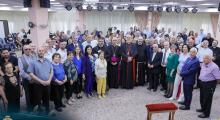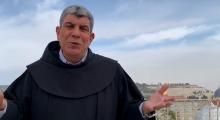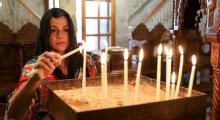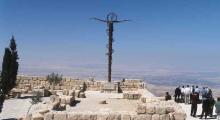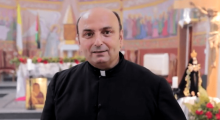Issued by the Catholic Center for Studies and Media - Jordan. Editor-in-chief Fr. Rif'at Bader - موقع أبونا abouna.org
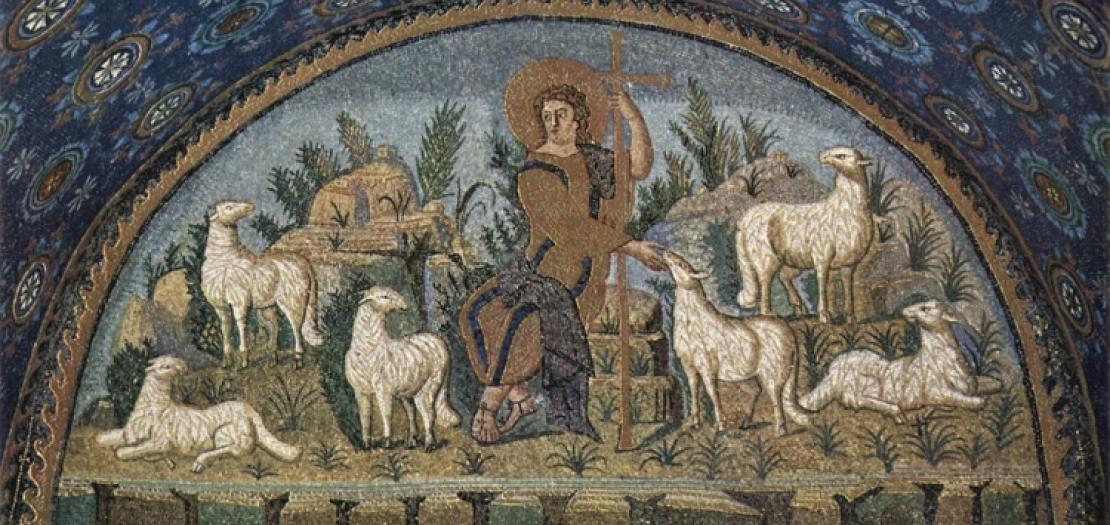
Following is the text of the meditation by Cardinal Pierbattista Pizzaballa, Latin Patriarch of Jerusalem, for the fourth Sunday of Easter, April 21, 2024:
Today's Gospel passage (John 10:11-18) is taken from chapter ten of John's Gospel, the so-called "Good Shepherd chapter".
It is no coincidence that the wisdom of the Church invites us to read this chapter in the Easter season: In fact, only in the light of Easter can we accept this Word and understand who this Good Shepherd is, who gives life in abundance. (John 10:10)
The chapter opens with the image of the door (John 10:2,7,9): Jesus, before presenting himself as the shepherd of the flock, presents himself as the door of the sheepfold.
Why the door? The door is essential for passage and communication between two places, between two realities. Without the door, two spaces could be so near but would remain isolated.
Jesus is the door: by his earthly life, by his death, and by his resurrection, he reopens the way of communication between heaven and earth, between Man and the Father.
"Open" is a fundamental verb in salvation history, to the point of coinciding, in some respects, with salvation itself. God saves by opening: he opens the sea, he opens a way of salvation in the wilderness, he opens a way back after the exile, he opens the heavens so that the drought may end, he opens the barren wombs so that life may pass.
Last Sunday, we saw that the Risen One opened the disciples' minds to the scriptures. (Luke 24:45)
But not only that: the disciples were locked in a place. (John 20:19) And just as Jesus, shortly before, had been locked in a tomb; and just as the tomb did not remain closed, but opened so that Jesus could resume life, so the disciples are also called to open up to life: the resurrection of Jesus opens the time of our resurrection, of our rebirth to life.
This is precisely why Jesus is the Good Shepherd because he opens the fold and brings his sheep out. (John 10:3-4) He does not leave them locked in their slavery, in fear of death, but he takes them out, sets them free: he opens for them the way of life.
And so, we come to today's passage.
Jesus is the Good Shepherd, as opposed to the hireling. (John 10:12)
Behind these two figures are two logics, two opposing lifestyles.
The mercenary acts only behind a fee, intending to gain: his service is always self-interested, and when the interest fails, so does the relationship, for it is not woven with intimacy and belonging: the sheep do not know the voice of strangers, of mercenaries.
Therefore, the mercenary does not offer security when he is faced with danger, he prefers to save his own life: when the wolf comes, he runs away, because he is afraid of death.
Jesus stands diametrically opposite.
He is not afraid of death, because he went through it first, and experienced that the Father's love did not leave him a prisoner of death, but reopened to him the way of life.
Thus, in His relationship with us, He does not seek personal gain, but rather ours: He came that we might have life and, for this purpose, He is willing to offer His own.
Jesus insists on this: no one takes it away from Him, but He, Himself, gives it. (John 10:15,17-18)
This is the Good Shepherd, the one who has passed through death, and from there, through this gate, he can lead the flock to the pasture of life. For we come out of death the moment we hear a word filled with true love.
Then, regarding us, the Lord has only a disinterested and free love, made of mutual knowledge and trust. And the sheep know his voice because the sheep will be willing to listen to the voice of the one who is willing to give all for them. On this voice, one can trust one's life.
One last passage: the love of the good shepherd is not limited to a category of people, to a group of privileged people. God has a longing for every man, and he wants to bring everyone out, so that we may become one flock, one family ("And I have other sheep that are not from this fold: these also I must lead." (John 10:16)
Then, what will make us one family is not so much human personal efforts, various techniques, and strategies, but the confident listening to a voice that calls all equally to come out.
For we only truly meet each other "outside": outside of prejudices, outside of petty affiliations, outside of mercenary logic. Only when everyone has come out, and thus saved, can we truly meet.
+ Pierbattista


